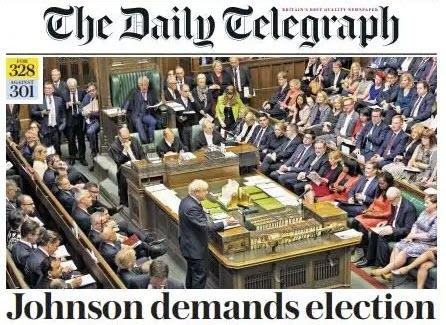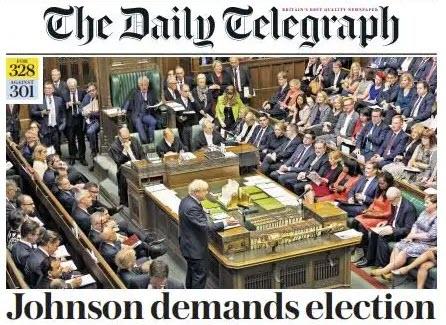Authored by Mike Shedlock via MishTalk,
A big filibuster was in progress then suddenly it vanished. Tories voted for the Benn bill blocking No Deal.
Sorting Out the Truly Weird
Remainers are bragging tonight that the Filibuster is broken. Guess who broke it.
Via Eurointelligence
The Conservatives in the House of Lords abandoned their filibuster in the early hours of this morning. The government whip in the Lords actively encouraged members to get the Brexit-extension bill approved by Friday. The bill would then return to the Commons for a final reading on Monday morning.
This looks to us like one of three things have happened overnight.
Maybe the government simply caved in as the Tory Lords realised that their filibuster would be broken eventually. Having a Brexit-supporting Lord reading the telephone book to you in order to kill time is right up there with the poetry-citing Vogons in the Hitchhikers' Guide to the Galaxy.
A second possibility is that the government may have concluded that it has other, more effective, means to frustrate the bill than an unpopular Lords filibuster. It could, for example, withhold Royal Assent. The legal expert Robert Craig recalls yet another arcane procedural requirement. It is called Queen’s Consent which - if you can believe it - is different from Royal Assent. Queen’s Consent relates to legislation that shifts the royal prerogative - in this case the right of the Crown, and the government as its agent, to conduct international negotiations. Withholding the Queen’s Consent would constitute an effective government veto. We are not in a position to offer any legal or procedural interpretation of our own, let alone to judge whether this avenue will be pursued.
A third possibility is that the government and opposition parties may have struck a deal on the next election. Yesterday, Labour abstained on the government motion under the fixed-terms parliaments act to hold early elections. There is a big debate within the Labour Party, with Keir Starmer and other pro-Remain MPs wanting to prevent Johnson from being able to trigger a no-deal Brexit even if he were to win elections.
We still believe that elections are more likely than not, simply because we don’t believe that Labour can hold its position for very long. Nicola Sturgeon, the leader of the Scottish National Party, also come out in favour of early elections and criticised Labour for trying to block it. The longer this stalemate goes on, the more it will reverberate against the party. As an opposition leader you don’t want to go into an election with the prime minister calling you a big girl’s blouse, as happened yesterday, or a chlorinated chicken.
Queen's Consent
I vote for the Eurointelligence second possibility, Queen's Consent.
Queen's Consent is different from Royal Assent.
I never heard of QC. I suspect 99.9% have not heard of it either.
But my overriding premise has always been that the Johnson team knows what it is doing.
I have amusing comments from UK expats telling me things like a filibuster is impossible, now bragging that the filibuster is broken, no doubt without even know it was the Johnson Tories who broke it.
Queen's Consent Legal Opinion
Let's investigate a Legal Opinion on Queen's Consent.
Emphasis is original, not mine.
Queen’s Consent is a procedural requirement for any Bill passing through the Commons and Lords where the terms of the Bill would ‘affect’ the exercise of any royal prerogative if it was passed. The effect on the prerogative must be more than de minimis.
Queen’s Consent is normally a formality, because the government usually proposes (or more accurately for Private Members Bills, acquiesces to) all Bills that are successfully voted through both Houses. The current scenario could see a situation where a Bill passes in the teeth of trenchant opposition from the government.
Prerogative powers are legacy powers of the Crown that are now mainly exercised by the government. Conducting foreign affairs, and in particular the power to agree treaties and operate treaty powers, is an important part of the prerogative and is the relevant power for this post. Under that power, the UK government has agreed new treaties, and particular laws, at EU level over the last 46 years (and indeed continues to do so).
The story behind the passage of Cooper-Letwin is more complex than many realise. The drafting of the original version was masterly. Cooper-Letwin mandated the then Prime Minister (PM) to seek an extension to the Article 50 process. The word ‘seek’ is crucial. The reason it is so crucial is that it allowed the argument to be made that Queen’s Consent was not necessary for the Bill. This was because to ‘seek’ an extension does not actually have any effect in terms of changing the date of exit at EU level. Seeking an extension arguably does not ‘affect’ prerogative exercise as a matter of law.
The sheer cleverness of the drafting of Cooper-Letwin rests on the fact that it left entirely open what would happen after the extension was ‘sought’. The negotiations and agreement of a new exit date were without doubt exercises of prerogative power and any Bill that sought to regulate or supplant those aspects of securing an extension would certainly have required Queen’s Consent during the passage of the Bill.
The issue of Queen’s Consent was taken very seriously during the passage of the Cooper-Letwin Bill and was so controversial it resulted in a [formal ruling](https://hansard.parliament.uk/Commons/2019-04-03/debates/0F559E56-033F-…(Withdrawal%29(No5%29Bill#contribution-DC5CD990-C745-4B29-825C-B2404A764AF4) by the Speaker. That ruling made clear that the original draft of the Bill did not require Queen’s Consent.
The Benn-Burt bill
If Benn-Burt had precisely followed the format of Cooper-Letwin and only mandated that the government seek an extension, then it would have placed no obligation on the PM to agree or accept any extension. That would remain part of the prerogative power to be exercised as the PM sees fit in his negotiations with the EU27.
However, Benn-Burt goes much further than Cooper-Letwin. It mandates that the PM must not only seek but also agree to an extension, either 31 January 2020 or another date if the Commons approves a date suggested by the EU27. Mandating that the PM agrees to an extension manifestly affects the prerogative. It is difficult to see how requesting Queen’s Consent can be avoided for this Bill. If so, it follows that the government must agree to the Bill being passed during Third Reading.
What is most fascinating about this dilemma is that the Cooper-Letwin prototype gave such clear and unequivocal evidence of where the bright line on Queen’s Consent is actually drawn by the legal experts who understand, and indeed determine, these issues within the Commons. Can there be any doubt that if a stronger wording could have been secured without triggering Queen’s Consent then such a wording would have been used last time?
Conclusion
The proponents of a new Bill to prevent No Deal are caught on the horns of a dilemma. If they had drafted a Bill that only mandated the PM to seek an extension, the PM would be left free to refuse to agreeor accept any extension in negotiations with the EU27.
But the actual Bill tries to impose a requirement that the PM either agrees to 31 January 2020 or agrees any new exit date suggested by the EU27 (as long as a motion approving the alternative date in the House of Commons is passed). House of Commons procedural rules mean that the government is required formally to approve the Bill by affirming ‘Queen’s Consent’ to the Bill at the Third Reading stage. This is because the power to agree or accept an extension is normally exercised using a prerogative power. If passed, this statute would have the legal effect, by whatever means, of forcing the PM to agree an extension to the Article 50 process would manifestly ‘affect’ the prerogative for the purposes of the relevant test as to whether Queen’s Consent is required.
Too Clever
The Benn Bill requires Johnson's approval. What do you think the odds of that are?
That's the long and short of it.
It's unclear if Benn knew this or not. It's possible he did and hoped Johnson would not catch it. More likely, the drafters of the Benn bill did not know.
Either way, the point is moot.
There is no way to force Johnson to approve this. And he won't, even if Bercow demands.
Benn can take it to the courts, but the law is clear.
Benn is Dead
I was mocked this evening "So, spin this all you want. You were wrong about all the procedures in parliament. Have YOU gone back to study parliamentary rules and UK law?"
Mind you, this is from the person who told me a filibuster in the House of Lords was not even possible.
I never presume I know everything. Clearly, I don't.
However, I have high confidence the Johnson team picked the dates very carefully and for a reason, even if I did not understand the reason.
Benn is dead unless it's part of a deal as per Eurointelligence option three.
Respectable Opinions
I highly respect the opinions of Eurointelligence.
Q: Why?
A: Because the outfit is staunchly pro-remain.
It's easy to find opinions supporting your view. It's damn hard to find someone saying what you want to hear when they disagree with the outcome.
Impressions are Deceptive
Here's another intelligent view point via Eurointelligence, but referencing a paywalled article Boris Johnson and Dominic Cummings Believe Their Plan Can Still Work.
Emphasis Mine.
While no one foresaw the scale of the rebellion a showdown with parliament was long planned
Johnson and his chief strategist, Dominic Cummings, deliberately planned and engineered last night’s defeat, goading the Commons into opposing him; he was lying to his party, parliament and the country when he claimed that he was being pushed into calling an election.
An early election that he could deny seeking is exactly what he has been scheming to achieve ever since he took power.
Bingo!
Eurointelligence comments "In particular, Number 10 remains confident that they will get early elections. On balance, we agree with that assessment."
Ignore the Nonsense
Yesterday I commented Ignore the Nonsense Reporting: Boris Johnson was Not Defeated, He Won Big Time.
Just the Facts Ma'am
Johnson goaded 21 problematic Rebel Tories into voting against him. Those Tories have been removed from the party and will lose their seats in the next election. Good riddance.
Because of foolish Remainer actions, Johnson will no longer have to go through the charades of working out a deal with the EU.
Johnson's hands are effectively bound and he welcomes that! He will not have to work out a deal. Instead he can lay the blame on the EU and on the Remainers for removing the option to negotiate with the EU.
By removing the 21 rebels, Johnson won the support of Nigel Farage thereby allowing a coalition between the Brexit Party and the Tories minus the rebel problem makes.
The Remainers are hopelessly split. Corbyn wants a referendum or the right to work out a customs deal with the EU. The Liberal Democrats want to remain. Many Labour party members want Brexit.
Delusional Remainers
My 5 comments from yesterday are backed up by events and independent analysis today.
Meanwhile, delusional Remainers keep believing they have the upper hand.
In reality, the Remainers do precisely what Johnson says: strip him of any chance of working out a deal.
It's debatable if Johnson really wants a deal. I don't pretend to know. I do know he cannot live with the backstop.
The deal question is moot even though the result sure isn't.
Johnson will form an alliance with the Brexit party if for no other reason than Remainers forced him into that hard stance.
Look for a big Johnson win in the next election whether or not he gives into the Benn bill to get it.



























